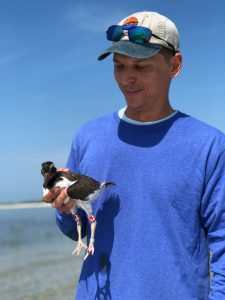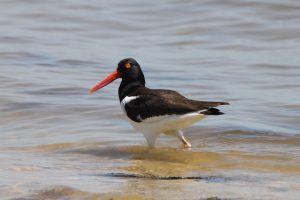
Nick Vitale is a recent WEC MS graduate.
What was your research about?
My research focused on a population of American Oystercatchers on the Gulf coast, and looking at factors that are limiting their reproductive success.
What did you find?
We looked at two major things.
First, the survival of nests and chicks on a day-to-day basis against predators and human disturbance. The other section was looking at long term factors, specifically habitat changes in the region and how a lot of the nesting habitat they use has degraded or gone away over time.
How could their situation be improved?
My study looked at two different sites, and there’s a different story for each of them.
One site was the Cross Florida Barge Canal Spoil islands down near Crystal River, which they are using. That area is really defined by having a lot of potential predators: raccoons, owls, peregrine falcons, you name it. So predator management or habitat management to limit how much that’s happening is probably the most important thing at that site.
My other site was Cedar Key. Islands around Cedar Key have undergone quite a bit of degradation and erosion over the last forty years, and a lot of the sites shorebirds were using have diminished. Shorebirds nest on the ground, so as these sites get smaller, and lower, they’re more prone to getting washed away during storm or high tide events.

Credit Nick Vitale
How did you get interested in shorebirds?
For shorebirds specifically, it just kind of worked out that way. My first internship in undergrad was with shorebirds in Cape Cod, Massachusetts. I did that for a few years, then switched gears and did some other bird related research around the country, and eventually circled back to it.
How did you become interested in ecology? Do you have an origin story?
I’ve always been interested in animals and the outdoors, and as a kid everyone told me, “Oh, you need to go be a veterinarian,” because that’s all anybody knew involving animals. I didn’t know what I wanted to do, but I knew I didn’t want to do that. When I started looking at colleges, I found out about wildlife management as a major, so I went and did my undergrad in that, and since then work and school has morphed into the conservation end of things. I’ve learned what I’m most interested in as I go.
What’s next?
My master’s research was partially funded through FWC, and for now I’m still working with their shorebird program around the state, but that’s not long term, so I’m still looking at options for what’s coming next!
 0
0
